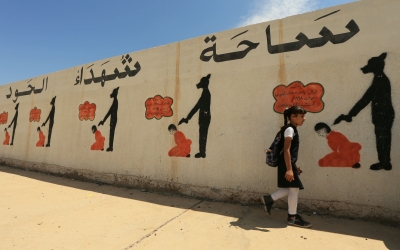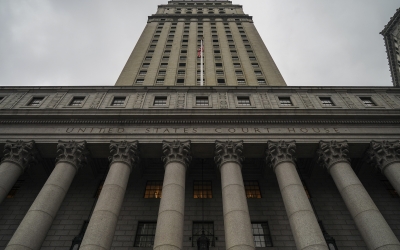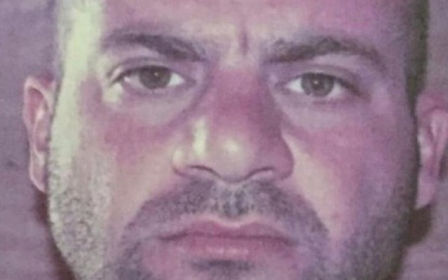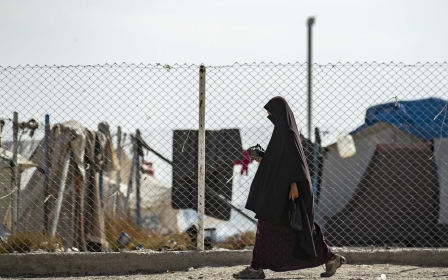Syrian Kurds to put suspected Islamic State foreign fighters on trial

Kurdish forces in Syria say they will hold trials for 1,000 foreigners in their custody who are suspected of having fought for the Islamic State (IS) group.
The Syrian Democratic Forces' (SDF) political arm said in a statement on Thursday that thesuspected fighters, who hail from more than 50 countries, will stand trial in Syria following a breakdown in negotiations that sought to repatriate them.
The announcement comes days after Syrian Kurdish officials met with the foreign minister of Finland for talks on the matter.
"We explained our intention to set up a special court for ISIS to the Finnish government and asked for help from the legal and technical aspects, and that this trial be transparent and public," the statement said, using another acronym for IS.
The 1,000 suspected fighters are currently being held in overcrowded detention centres by the SDF.
New MEE newsletter: Jerusalem Dispatch
Sign up to get the latest insights and analysis on Israel-Palestine, alongside Turkey Unpacked and other MEE newsletters

The trials will not include about 4,000 women, held in three squalid refugee camps in the area who have been accused of involvement with IS.
Another 8,000 children are also held in the camps.
Local authorities had hoped that the countries would take back their citizens to be prosecuted in their countries of origin, but there has been little movement on that initiative despite US pressure in favour of repatriation.
The SDF had also sought the implementation of an internationally recognised tribunal that could hold trials for those detained, but that also failed to receive international support.
On Thursday, the Syrian Kurdish external affairs ministry declared that it would begin trials under its own authority, but continued to call for international support.
"This is an international crisis and an international solution must be found. Unfortunately, many states have not responded to our appeals," the statement continued.
"For example, we have handed over less than 10 percent of IS-linked children to their countries so far. There is the urgent need for a solution to this issue in our region, and to pressure states to receive their nationals."
The SDF, with the help of the United States, transferred almost 900 suspected IS members, some of whom were European citizens, into Iraqi custody last year, despite objections by human rights groups.
Unlike Iraq, the Syrian Kurdish administration has said it would not seek the death penalty in the cases of former IS fighters. Those found guilty of war crimes would be sentenced to life imprisonment, the Guardian reported.
It was unclear who would pay for the continued detention of the foreigners, but Kurdish forces have expressed optimism that the international community will contribute to the costs.
Refusing repatriations
Last June, eight Americans - two women and six children - who had been captured by Kurdish forces in Syria were returned to the US. Their case was the first publicly announced repatriation of US citizens affiliated with IS.
Still, most countries, particularly those in Europe, have refused to repatriate IS fighters for several reasons. Many countries fear it would be difficult to prosecute returned suspected fighters amid a lack of usable evidence in their cases.
The UN's International, Impartial and Independent Mechanism (IIIM), established in 2016, is working to gather evidence that it hopes can assist international efforts to investigate and prosecute people who have committed crimes under International Law in Syria since 2011.
In addition to those concerns, unlike the US, many European countries lack the needed laws to put such fighters behind bars for long periods of time, and even then, many countries fear the spread of radicalisation within prisons.
Instead of taking back their citizens en masse, most countries have only accepted repatriations on a case-by-case basis. In other cases, countries have chosen to revoke citizenship completely, rejecting any responsibility for their cases.
Syria's Kurdish forces were instrumental in the fight to remove the IS group from Syria but suffered a serious hit in October when US President Donald Trump allowed Turkey to invade the border region in northern Syria.
Concern over the continued imprisonment of thousands of suspected IS fighters increased during the incursion, as the SDF said it could not guarantee its ability to both maintain the prison camps and deal with the Turkish offensive.
Middle East Eye delivers independent and unrivalled coverage and analysis of the Middle East, North Africa and beyond. To learn more about republishing this content and the associated fees, please fill out this form. More about MEE can be found here.





